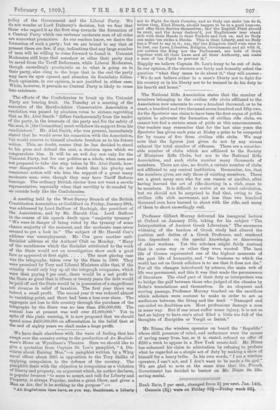Professor Gilbert Murray delivered his inaugural lecture at Oxford on
January 27th, taking for his subject "The Interpretation of Ancient Greek Literature." The enormous widening of the borders of Greek study had altered the position and dutiee of a Greek Professor, and rendered him dependent on the special knowledge or discoveries of other workers. Yet the scholars might fairly contend that in some way or other they were wanted. The best life of Greece represented one of the highest moments of the past life of humanity, and "the business to which the world has set us Greek scholars is to see that it does not die." For all the changes introduced by science, the main web of life was permanent, and this it was that made the permanence of literature. The chief part of their duty as interpreters was to bridge the gulf between those who judged of the classics by Bohn's translations and themselves. In an eloquent and moving passage, Professor Murray touched on the sacrifices which scholars were content to make in order to act as mediators between the living and the dead. "Damaged and one-sided we doubtless are. Most professions damage a man in some way. But if one must suffer some injury, it is not so bad an injury to have one's mind filled a little too full of the thoughts of Euripides or Vergil or Isaiah."









































 Previous page
Previous page